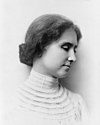
Helen Adams Keller was an American author, disability rights advocate, political activist and lecturer. Born in West Tuscumbia, Alabama, she lost her sight and her hearing after a bout of illness when she was 19 months old. She then communicated primarily using home signs until the age of seven, when she met her first teacher and life-long companion Anne Sullivan. Sullivan taught Keller language, including reading and writing. After an education at both specialist and mainstream schools, Keller attended Radcliffe College of Harvard University and became the first deafblind person in the United States to earn a Bachelor of Arts degree.

Anne Bancroft was an American actress. Respected for her acting prowess and versatility, Bancroft received an Academy Award, three BAFTA Awards, two Golden Globe Awards, two Tony Awards, two Primetime Emmy Awards, and a Cannes Film Festival Award. She is one of only 24 thespians to achieve the Triple Crown of Acting.

The Miracle Worker refers to a broadcast, a play and various other adaptations of Helen Keller's 1903 autobiography The Story of My Life. The first of these works was a 1957 Playhouse 90 broadcast written by William Gibson and starring Teresa Wright as Anne Sullivan and Patricia McCormack as Keller. Gibson adapted his teleplay for a 1959 Broadway production with Patty Duke as Keller and Anne Bancroft as Sullivan. The 1962 film also starred Bancroft and Duke. Subsequent television films were released in 1979 and in 2000.

Anne Sullivan Macy was an American teacher best known for being the instructor and lifelong companion of Helen Keller.

Anna Marie "Patty" Duke was an American actress and mental health advocate. Over the course of her acting career, she was the recipient of an Academy Award, two Golden Globe Awards, three Primetime Emmy Awards, and a star on the Hollywood Walk of Fame.

William Gibson was an American playwright and novelist. He won the Tony Award for Best Play for The Miracle Worker in 1959, which he later adapted for the film version in 1962.

Deafblindness is the condition of little or no useful hearing and little or no useful sight. Different degrees of vision loss and auditory loss occur within each individual. Because of this inherent diversity, each deafblind individual's needs regarding lifestyle, communication, education, and work need to be addressed based on their degree of dual-modality deprivation, to improve their ability to live independently. In 1994, an estimated 35,000–40,000 United States residents were medically deafblind. Helen Keller was a well-known example of a deafblind individual. To further her lifelong mission to help the deafblind community to expand its horizons and gain opportunities, the Helen Keller National Center for Deaf-Blind Youths and Adults, with a residential training program in Sands Point, New York, was established in 1967 by an act of Congress.
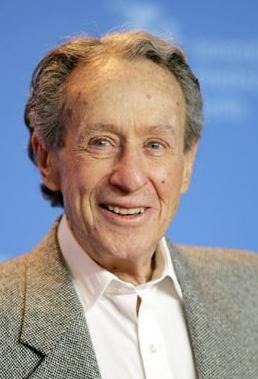
Arthur Hiller Penn was an American director and producer of film, television and theater. Closely associated with the American New Wave, Penn directed critically acclaimed films throughout the 1960s such as the drama The Chase (1966), the biographical crime film Bonnie and Clyde (1967) and the comedy Alice's Restaurant (1969). He also received attention for his acclaimed revisionist Western Little Big Man (1970). Night Moves (1975) and The Missouri Breaks (1976), though commercially unsuccessful, generated positive reviews.

Patricia McCormack is an American actress with a career in theater, films, and television.
Helen Keller: The Miracle Continues is a 1984 American made-for-television biographical film and a semi-sequel to the 1979 television version of The Miracle Worker. It is a drama based on the life of the blind and deaf Helen Keller and premiered in syndication on April 23, 1984, as part of Operation Prime Time syndicated programming.
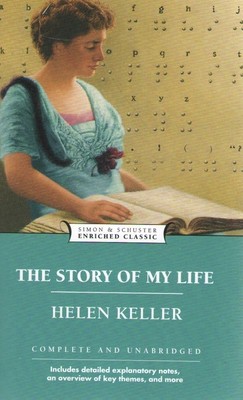
The Story of My Life, first published in book form in 1903, is Helen Keller's autobiography detailing her early life, particularly her experiences with Anne Sullivan. Portions of it were adapted by William Gibson for a 1957 Playhouse 90 production, a 1959 Broadway play, a 1962 Hollywood feature film, and the Indian film Black. The book is dedicated to inventor Alexander Graham Bell, who was one of her teachers and an advocate for the deaf.

Torin Herbert Erskine Thatcher was a British actor who was noted for his flashy portrayals of screen villains.
Stage-to-film is a term used when describing a motion picture that has been adapted from a stage play. There have been stage-to-film adaptations since the beginning of motion pictures. Many of them have been nominated for, or have won, awards.

The Miracle Worker is a 1962 American biographical film about Anne Sullivan, blind tutor to Helen Keller, directed by Arthur Penn. The screenplay by William Gibson is based on his 1959 play of the same title, which originated as a 1957 broadcast of the television anthology series Playhouse 90. Gibson's secondary source material was The Story of My Life, the 1903 autobiography of Helen Keller.
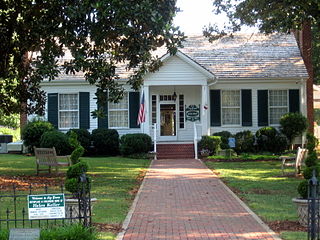
Ivy Green is a historic house museum at 300 West North Commons in Tuscumbia, Alabama, United States. Built in 1820, it was the birthplace and childhood home of Helen Keller (1880–1968), who became well known after overcoming deaf-blind conditions to communicate; she became an author and public speaker. Designated as a National Historic Landmark, it is now operated as a museum honoring and interpreting Keller's life.

The Miracle Worker is a three-act play by William Gibson adapted from his 1957 Playhouse 90 teleplay of the same name. It was based on Helen Keller's 1903 autobiography The Story of My Life.
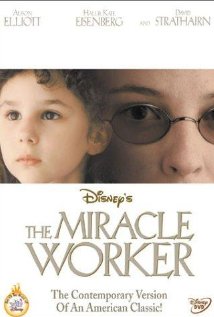
The Miracle Worker is a 2000 American made-for-television biographical film based on the 1959 play of the same title by William Gibson, which originated as a 1957 broadcast of the television anthology series Playhouse 90. Gibson's original source material was The Story of My Life, the 1903 autobiography of Helen Keller. The play was adapted for the screen twice before, in 1962 and 1979. The film is based on the life of Helen Keller and Anne Sullivan's struggles to teach her. The film premiered on ABC as part of The Wonderful World of Disney on November 12, 2000.
A miracle worker is a magician or saint purportedly capable of working magic or miracles.

Helen Keller Day is a commemorative holiday to celebrate the birth of Helen Keller, observed on June 27 annually. The holiday observance was created by presidential proclamation in 2006, as well as by international organizations, particularly those helping the blind and the deaf. The holiday is generally known for its fashion show held on June 27 annually for fundraising purposes.
Aloka Chandra McLean is a Canadian actress. She is most noted for her role in the film The Lotus Eaters, for which she received a Genie Award nomination for Best Actress at the 14th Genie Awards in 1993. The Lotus Eaters was her first film role; around the same time, she had her first stage role playing Helen Keller in a Vancouver production of The Miracle Worker.













